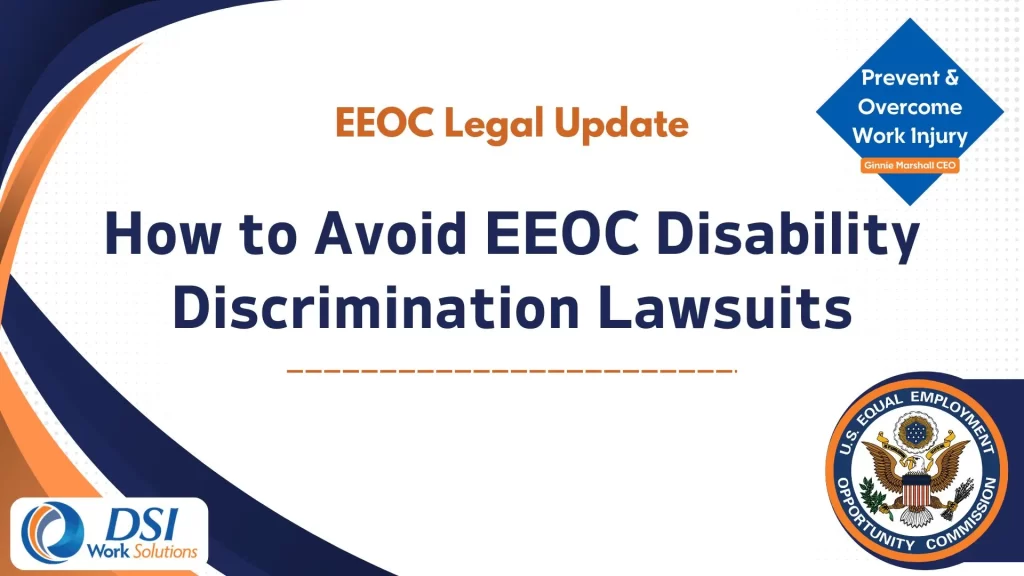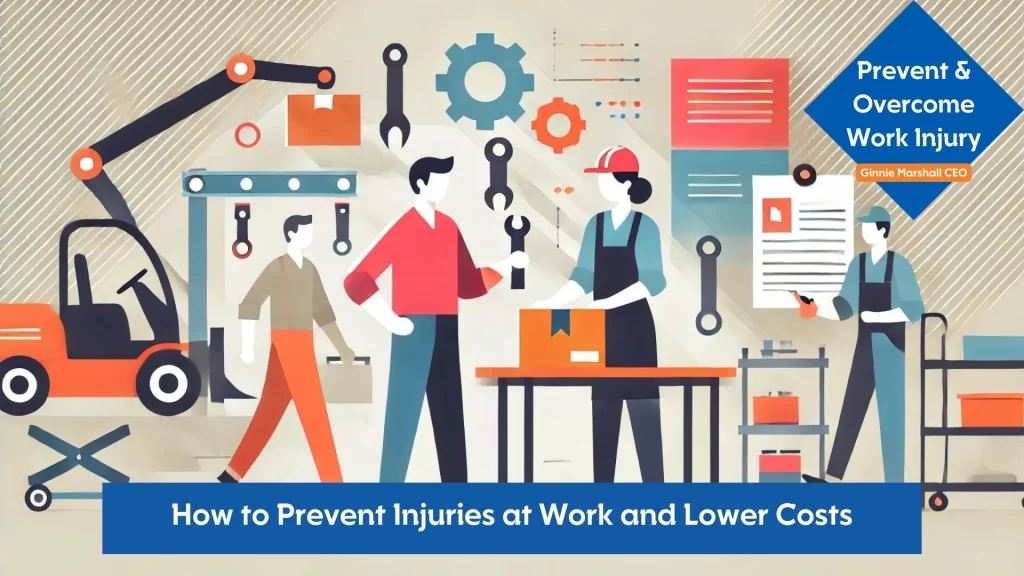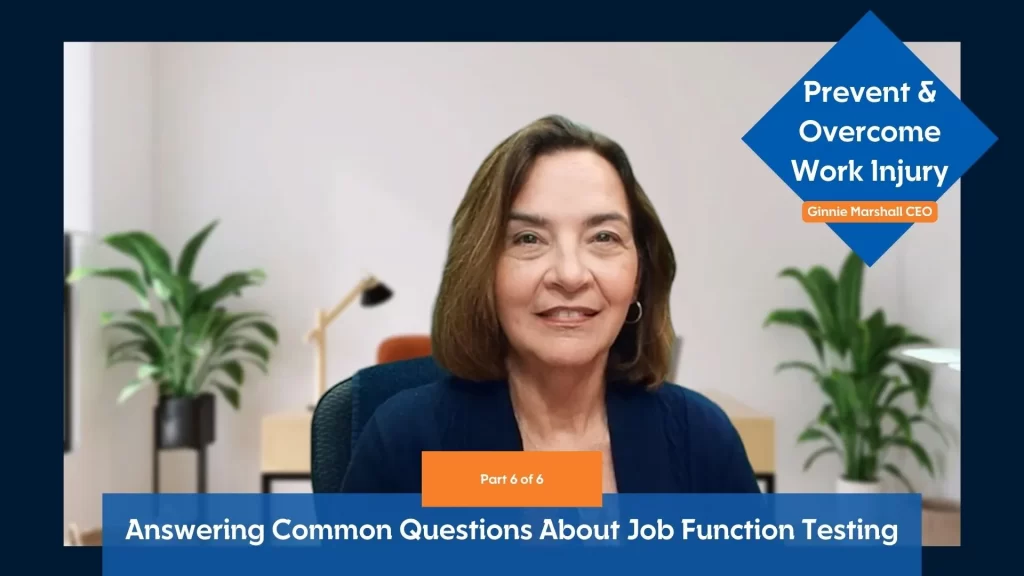Introduction
Functional Capacity Evaluations (FCE) serve as a critical tool for assessing an individual’s ability to perform work-related activities, particularly following an injury or illness. These evaluations form effective rehabilitation strategies and guide return-to-work decisions. In the fourth part of our educational series, I focus on the pivotal questions that FCEs aim to answer.
I want to shed light on the essential aspects of FCEs, particularly the referral questions that lead healthcare professionals to recommend them. We’ll examine the evaluation of an individual’s workability after an injury, their overall work capacity, the identification of specific functional impairments related to their condition, the determination of necessary workplace accommodations, and the role of FCEs in legal contexts.

Assessing Current Workability
A critical component of Functional Capacity Evaluations is assessing an individual’s current workability, especially after they’ve suffered an injury. This assessment is pivotal in determining whether a person can resume their previous job responsibilities effectively and safely. In this process, we meticulously evaluate various physical and cognitive aspects relevant to their specific job requirements. This includes, but is not limited to, strength, endurance, flexibility, and other skills pertinent to their occupational role.
The significance of this assessment lies in its ability to inform and shape return-to-work strategies. It serves as a foundation for making informed decisions about an individual’s readiness to re-enter the workforce, and if so, under what conditions. For instance, if the evaluation reveals certain limitations, it may lead to recommendations for modified duties or a graduated return to work. On the other hand, if the assessment indicates a full recovery, it can facilitate a seamless transition back to their original role. Ultimately, this segment of the FCE ensures that return-to-work plans are not only effective but also prioritize the individual’s health and safety.

Evaluating General Workability
Beyond assessing the ability to return to a specific job post-injury, Functional Capacity Evaluations play a crucial role in gauging an individual’s general workability. This evaluation becomes particularly significant once a person has reached what is considered their peak medical improvement. At this juncture, it’s essential to understand not just their capability to perform tasks specific to their previous job, but also to gauge their overall work abilities in a broader context. This comprehensive assessment includes evaluating physical capabilities, cognitive functions, and other skills that are transferable across different job roles.
The role of FCEs in establishing work restrictions and capabilities is a key aspect of this evaluation. Based on the outcomes of the FCE, we can determine if and what kind of work restrictions might be necessary. For some individuals, this might mean a recommendation for lighter duties or a need for ergonomic adjustments at the workplace. For others, it might involve identifying new job roles that align better with their current capabilities. These recommendations are vital not only for the individual’s health and safety but also for ensuring they are placed in a role where they can be productive and successful. Such evaluations, therefore, serve as a bridge between medical recovery and practical, sustainable employment solutions.
Identifying Functional Impairments Related to Injuries
A key aspect of Functional Capacity Evaluations is the precise identification of functional impairments that stem from workplace injuries. This process involves a detailed assessment of the individual’s physical and cognitive capabilities in relation to the specific injury they have sustained. Through a series of targeted tests and evaluations, FCEs are designed to pinpoint how the injury impacts the individual’s ability to perform certain tasks or movements that are crucial in their job role. For instance, if an individual has suffered a hand injury, the FCE would assess their grip strength, dexterity, and endurance in tasks requiring manual manipulation.
The findings from these evaluations hold significant importance in the context of insurance and workers’ compensation claims. Accurately identifying and documenting the extent and nature of the injury-induced impairments is crucial for these processes. It helps in determining the validity of a claim, the extent of compensation, and the necessary accommodations or modifications required for the injured employee. In some cases, these evaluations can also guide the course of ongoing therapy or rehabilitation, ensuring that it is tailored to address specific deficits identified during the FCE. Therefore, this component of the FCE is not only vital for understanding the impact of the injury on the individual’s work life but also plays a crucial role in ensuring that they receive fair and appropriate support from insurance and compensation systems.

Determining the Need for Reasonable Accommodations
In Functional Capacity Evaluations, a crucial step is identifying areas in the workplace that may require adjustments or accommodations for individuals with disabilities or recovering from injuries. This process entails a comprehensive analysis of the individual’s job responsibilities juxtaposed against their current functional abilities. By pinpointing these areas, we can ascertain where modifications are needed to facilitate effective job performance while prioritizing the individual’s health and safety.
The FCE provides vital insights into the specific types of accommodations that might be necessary. For instance, in cases of back injuries, recommendations might include ergonomic solutions or altered work schedules. These evaluations are essential in guiding constructive discussions among employees, employers, and healthcare providers, ensuring that any proposed accommodations are practical, targeted, and supportive of the individual’s unique needs, thus fostering a more inclusive and adaptable work environment.
Functional Evidence and Its Legal Importance
FCEs hold significant weight in legal contexts, particularly in cases involving workplace injuries or the need for accommodations. The objective evidence yielded from FCEs is invaluable in providing a clear, unbiased view of an individual’s functional abilities and limitations. This aspect of FCEs is crucial in legal proceedings, as it offers concrete data that can substantiate claims or clarify disputes related to workplace injuries.
Attorneys representing either employees or employers in cases of workplace injuries often rely on the evidence from FCEs to build their arguments. The detailed assessment can support claims for compensation, justify the need for specific accommodations, or even challenge the legitimacy of a claim. In essence, the FCE provides a factual basis for legal decisions, ensuring that they are grounded in accurate and thorough evaluation of the individual’s capabilities and the impact of their injury on their work life. This makes FCEs an indispensable tool in bridging the gap between medical assessment and legal resolution in workplace injury cases.

Learn and Grow
In the spirit of continuous learning and professional growth, I encourage you to further your expertise in this crucial field. Our FCE Independent Learning course offers a comprehensive, flexible learning experience tailored for busy professionals. With 6 hours of on-demand video content, 12 months of access, and an inclusive FCA Productivity Suite, this course is designed to enrich your understanding and enhance your skills in FCE. The convenience of learning from anywhere allows you to integrate this valuable resource into your daily routine seamlessly. Furthermore, the course is not only about learning but also about application. By completing the course and passing the quiz, you will earn 7 credit hours and receive a certification, symbolizing your dedication and newfound proficiency in FCE.
I invite you to visit our website, set up a free account, and start with the first lesson at no charge. As you embark on this journey of professional development, remember that your growth in this field is a direct investment in the quality of care you provide. And don’t forget, the third video in our series is on the horizon, promising to delve deeper into the fascinating world of Functional Capacity Evaluations. Stay tuned for more insights and learning opportunities!












.webp)